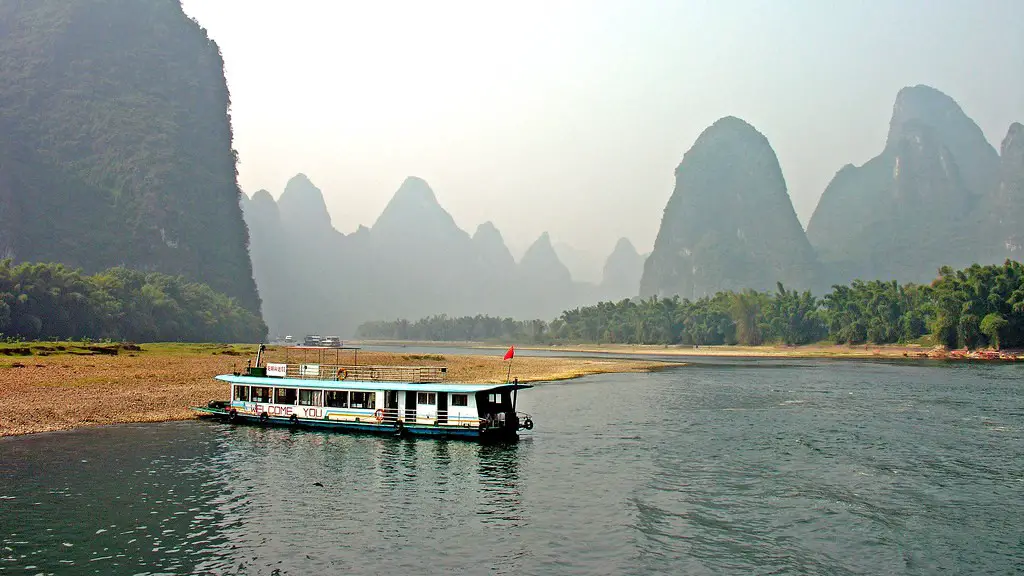Benefits of the Mississippi River to People
The Mississippi River is one of the longest rivers in the world. It spans over 1800 miles and exists in parts of 10 different US states. This incredible body of water has been a great help to people and civilizations throughout the centuries.
The Mississippi River has been used by Native American tribes as a highway and transportation hub for a long time. Not only were they able to move quickly from one location to another by using the river, but they were also able to take advantage of its vast resources. Tribes could fish, hunt, and even produce pottery from the muddy banks and flood plain of the Mississippi River.
The river has also been a great source of economic growth for the region. According to the U.S. Army Corps of Engineers, the value of goods that traveled on the Mississippi to and from ports on the Gulf of Mexico has grown from $7.8 billion in 1980 to $48.6 billion in 2018. Moreover, the Corps reports that recreational activities linked to the Mississippi River generated around $22.2 billion in economic output in 2018.
Thanks to its vast expanse, the Mississippi River has also provided many people with access to clean water. In the Southern parts of the US, the river has proved to be an important resource in providing clean drinking water to cities and towns located along its banks.
Perhaps one of the greatest benefits of the Mississippi River is what it has done for the areas surrounding it. Thanks to the natural ecosystems that have sprung forth, there has been a greater abundance of wildlife and a more diverse ecosystem. This has in turn helped to improve the food supply in the region and create a more sustainable way of life.
Overall, it is clear that the Mississippi River has given much to the people of the US and will continue to do so in the future.
With a length of over 1800 miles, navigating and utilizing the Mississippi River are not easy tasks. The river is constantly changing, with sandbars and shoals shifting from year to year. This makes it even more difficult for vessels to make safe passage through.
Navigation aids such as buoys and markers have been used for centuries to aid people in navigating their way through the river. Today, vessel traffic is also managed with the help of the U.S. Coast Guard and the U.S. Army Corps of Engineers. They maintain navigation channels through the Mississippi and monitor the level of the river to ensure vessels have a safe passage.
It is not only navigation that is managed on the Mississippi River, but also the development of the waters. Many projects have been developed to improve the overall environment of the river. These include adding aquatic vegetation and sedimentation control structures to the shorelines, as well as creating habitat for fish and birds.
The river is also used for commercial purposes. Companies have been making use of the Mississippi to transport agricultural products, as well as crude oil up and downstream. In addition, the river is home to a number of hydropower plants that generate electricity for the region.
Hazardous of Mississippi River
While the Mississippi River is an important source of transportation, food, water and electricity for many people, it does come with some risks.
The rush of debris and sedimentation that some areas of the river experience can create hazardous conditions. These can include the formation of large islands of debris, which can put the safety of passengers and vessels at risk.
Heavy rains and flooding can also increase the velocity of the river, causing it to overflow its banks and submerge cities and towns. Many areas have been flooded repeatedly, which has caused significant economic and emotional damage to residents of these areas.
The Mississippi River also experiences drought conditions in some areas, putting strain on the availability of freshwater supplies. This can cause water shortages that can lead to economic hardship and disruption of daily life in the region.
Finally, pollution of the river is a major concern. Due to its size and vastness, the river has become a dumping ground for all sorts of hazardous materials, including industrial and agricultural waste, which poses a major health risk to the people who live in its vicinity.
Ecological Impact of Mississippi River
The Mississippi River also plays an important role in the ecology of the region. The rivers’ vast expanse has created a unique environment for many species of plants and animals to thrive.
The river’s high levels of nutrients help to provide essential food for fish, amphibians and other species that rely on these resources for survival. In addition, the river’s abundance of aquatic vegetation provides a habitat for a variety of birds and mammals.
It has also been observed that the Mississippi River helps to regulate the climate in the region. The river’s waters absorb and release heat, helping to moderate the temperature and make certain areas more habitable.
Overall, it is clear that the Mississippi River has a major impact on the ecology of the region and helps to sustain a variety of species.
The Future of Mississippi River
Looking towards the future, there are a number of steps that can be taken to ensure that the Mississippi River is kept healthy and functional.
Firstly, steps must be taken to reduce the amount of pollution that is entering the river. This includes reducing the release of industrial and agricultural runoff into the water.
In addition, there needs to be greater investment in maintenance of the navigation channels and water levels. The U.S. Army Corps of Engineers should be given the resources to monitor these areas and ensure that they are safe for vessels to navigate.
Finally, more should be done to preserve the natural ecosystems that have sprung up around the Mississippi River. This means preserving and protecting the wetlands, floodplains and other areas that are critical to the balance of nature.
Influencing Factors of Mississippi River
The Mississippi River is highly susceptible to the environment both directly and indirectly.
The most obvious example of the direct environmental effects is the degree of water temperature. The surface and subsurface temperatures fluctuate depending on how much sunlight reaches the river and on how much cold water from groundwater sources has been released. This, in turn, affects the properties of the river and how it can be utilized.
Indirectly, the river is also affected by environmental regulations. These regulations can range from laws and regulations concerning building and development on the banks of the river to agricultural practices that may affect water quality.
The Mississippi River is also highly sensitive to the management of its tributaries and to floods. Poor management of runoff can lead to sedimentation and flooding, while better management can make the river much more manageable.
Impact of Mississippi River on Development
The Mississippi River has been declared a Waterway of National Significance by the U. S. government and is therefore very important in supporting the economic development of the region.
The development of ports and levee systems has enabled the movement of cargo up and down the Mississippi as well as to other parts of the world. In addition, the development of railway systems around the Mississippi has led to increased industrial growth and better transportation infrastructure.
The river has also been a major source of electricity in the region. Hydropower plants have been constructed along the length of the Mississippi to generate electricity for local communities and industries.
Finally, the river has provided employment opportunities for many people in the area. From the fishermen and commercial barge captains to the many engineering and construction jobs that have come up due to the development of the river, the Mississippi has been a major factor in helping the local economy.

